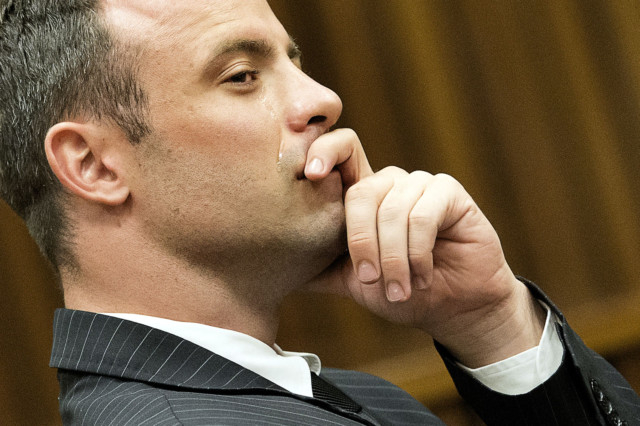
PRETORIA: South African Paralympic athlete Oscar Pistorius on Tuesday arrived at the Pretoria high court where he will be sentenced for shooting dead his girlfriend on Valentine's Day last year.
Looking grim, Pistorius made his way through a throng of media and onlookers to hear whether he goes to jail or receives a lesser penalty of community service after being found guilty of culpable homicide.
His fate lies in the hands of Judge Thokozile Masipa, who will announce her decision after the prosecution called for 10 years in jail and the defence pleaded for house arrest and community service.
The judge last month acquitted the double amputee sprinter of the more serious charge of murder over Reeva Steenkamp's death. But she found him guilty of culpable homicide, for which the punishment can range from a fine to jail time.
Pistorius claims he shot Steenkamp, a 29-year-old law graduate and model, four times through a locked bathroom door at his upmarket Pretoria home after he mistakenly believed she was an intruder.
His lawyers, arguing that Pistorius would be more vulnerable than most in prison because of his disability, have called for three years of "correctional supervision", the equivalent of house arrest for the 27-year-old.
They also suggested that Pistorius could carry out 16 hours of community service a month cleaning a Pretoria museum.
Prosecutor Gerrie Nel said such a sentence would be "shockingly inappropriate" and could cause South Africans to lose faith in their legal system.
'More equal than others'
The trial has drawn international attention and media gathered outside the courthouse shortly after dawn to get into position for the star runner's entrance and the arrival of friends and families on both sides of the case who have attended the long trial.
A man dressed in prison orange draped himself in chains, holding a sign that says "are certain offenders more equal than other offenders before the law?"
The consensus on the street outside the North Gauteng High Court was that Pistorius should be jailed for 10 years - the sentence the state suggested.
"I think Oscar must get a sentence for the thing he has done," said Amon Aphane, a 63-year-old taxi driver sitting outside the court, "10 years is enough".
Aphane says the opinion of his many customers is unanimous: Pistorius should serve time. "Everyone says he needs to be punished," says Aphane. "That lady is also a human being, you see, her family is still crying, you see."
Legal experts were divided on which way Judge Masipa will swing.
"There is a strong argument to be made for certainly a period of direct imprisonment," said William Booth, a criminal lawyer based in Cape Town. "You do have to send a message to the public."
But even if Pistorius does not spend any time behind bars, Booth said he would not be getting off "scot free" as "correctional supervision is recognised as a fairly severe sentence".
Despite being unpalatable to many South Africans, a house arrest sentence would be fitting for Pistorius, said Kelly Phelps, a law lecturer at the University of Cape Town.
Defence lawyer Barry Roux said the "broken" Pistorius was an ideal candidate for a non-custodial sentence given his remorse, his status as a first-time offender and the fact that he would be an easy target in South Africa's notoriously brutal jails.
The athlete made history by becoming the first Paralympian to compete against able-bodied athletes at the 2012 London Olympics, inspiring millions with his story.
But during his trial the prosecution painted a darker picture of the one-time sports star, presenting a dangerously volatile young man with a penchant for guns, beautiful women and fast cars.
Both the state and the defence have the right to appeal the verdict, potentially dragging out the legal proceedings for years to come.
Whatever the outcome, Pistorius has lost his glittering sports career, lucrative contracts and - above all - his hero status, tarnished forever.













